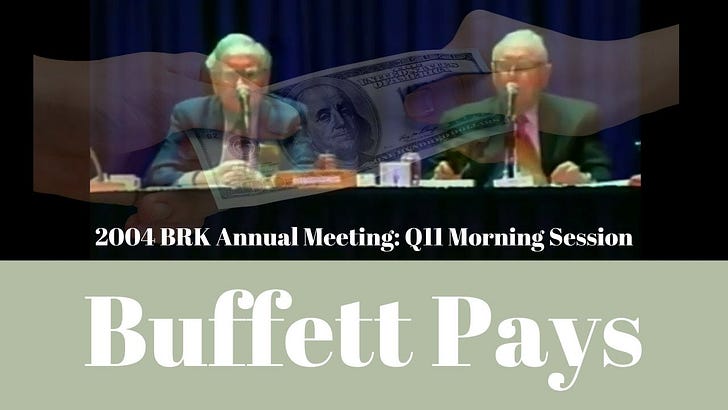84: Buffett On Compensation Plans (2004)
"I'd rather throw a viper down my shirtfront than hire a compensation consultant."
You’re reading the weekly free version of Watchlist Investing. If you’re not already subscribed, click here to join 1,600 others.
Want more in-depth and focused analysis on good businesses? Check out some sample issues of Watchlist Investing Deep Dives.
For less than $17/month, you can join corporate executives, professional money managers, and students of value investing receiving 10-12 issues per year. In addition, you’ll gain access to the archives, now 18 issues and growing!
Buffett On Comp: 2004 Edition
I’ve spent a lot of time trying to determine just how Berkshire Hathaway compensates its managers. In fact, I asked the very last question at the 2018 annual meeting on the topic.
In 2004, Buffett was asked about an executive compensation plan that MidAmerican Energy (now Berkshire Hathaway Energy) had for its two key managers.
The MidAmerican plan, which Buffett devised, took about three minutes to sketch on a yellow pad, according to Buffett.
Another, for the CEO of Fruit of the Loom, “… takes up a paragraph or two. And that’s what we’ll have for [the CEO John Holland] the rest of his life.
At GEICO “we have two variables and they’re what count … from [CEO] Tony Nicely on down, we have everyone participating based on that.”
“We have an arrangement at See’s Candy with [then CEO] Chuck Huggins. We worked it out in 1972. It’s still in force now.”
These statements from Buffett indicate Berkshire’s compensation arrangements are simple, tied to the underlying economics of the business, and scalable.
Simple: While Buffett is brilliant, clearly something that took a few minutes to determine (if we’re to believe Buffett, which I do) can’t be that complicated. Take the GEICO example, which Buffett has explained in detail elsewhere. The two variables are growth in policies in force and the profitability of seasoned business. That’s it. The first incentivizes growth of the business, which hurts near term profits, and the second incentivizes writing good business.
Tied to the underlying economics: Berkshire makes sure to tie its compensation plans to the specific business the manager controls. Some of Berkshire’s businesses, like See’s, are simple and “easy” businesses. Others, like footwear or apparel manufacturing, are “hard”. In this way, Buffett makes an adjustment for the relative headwind or tailwinds managers face.
Scalable: Finally, scalability is important. A plan put in place with a specific dollar profit would soon be outdated if the business were in growth mode. Worse, it could incentivize growing a business with subpar profitability. My guess is that most of Berkshire’s plans are tied to return on capital. The arrangement for Todd Combs and Ted Weschler is a good example of this. The two investment managers are paid 10% of their outperformance over the S&P 500 on a rolling three-year basis, with 80% tied to their specific performance and 20% tied to the other man (to incentivize cooperation). What I love about this is that it scales perfectly with the amount of assets they manage. A 10% outperformance with $1bn AUM would amount to a $10m payday. Now increase AUM to $10bn, which makes outperforming the market that much harder. Just a 1% outperformance would lead to the same $10m payday.
Speaking of incentives, Buffett, as a large owner of Berkshire Hathaway, is spending his own money when devising these compensation plans. He has every interest to make sure that the manager is maximizing the value of the asset placed under his/her care and ensuring that money isn’t wasted on average performance. I cringe when I see 100+ page proxy statements filled with complex and undecipherable compensation plans that reward managers for average performance and which probably cost a fortune to devise and put down on paper. Why not just keep it simple?!
I hope that when Greg Abel is in the CEO chair he keeps Berkshire’s rational approach in place. Charlie Munger would come back from the grave and haunt him if he ever used a compensation consultant.
Watch the full clip below.
Stay rational! —Adam





